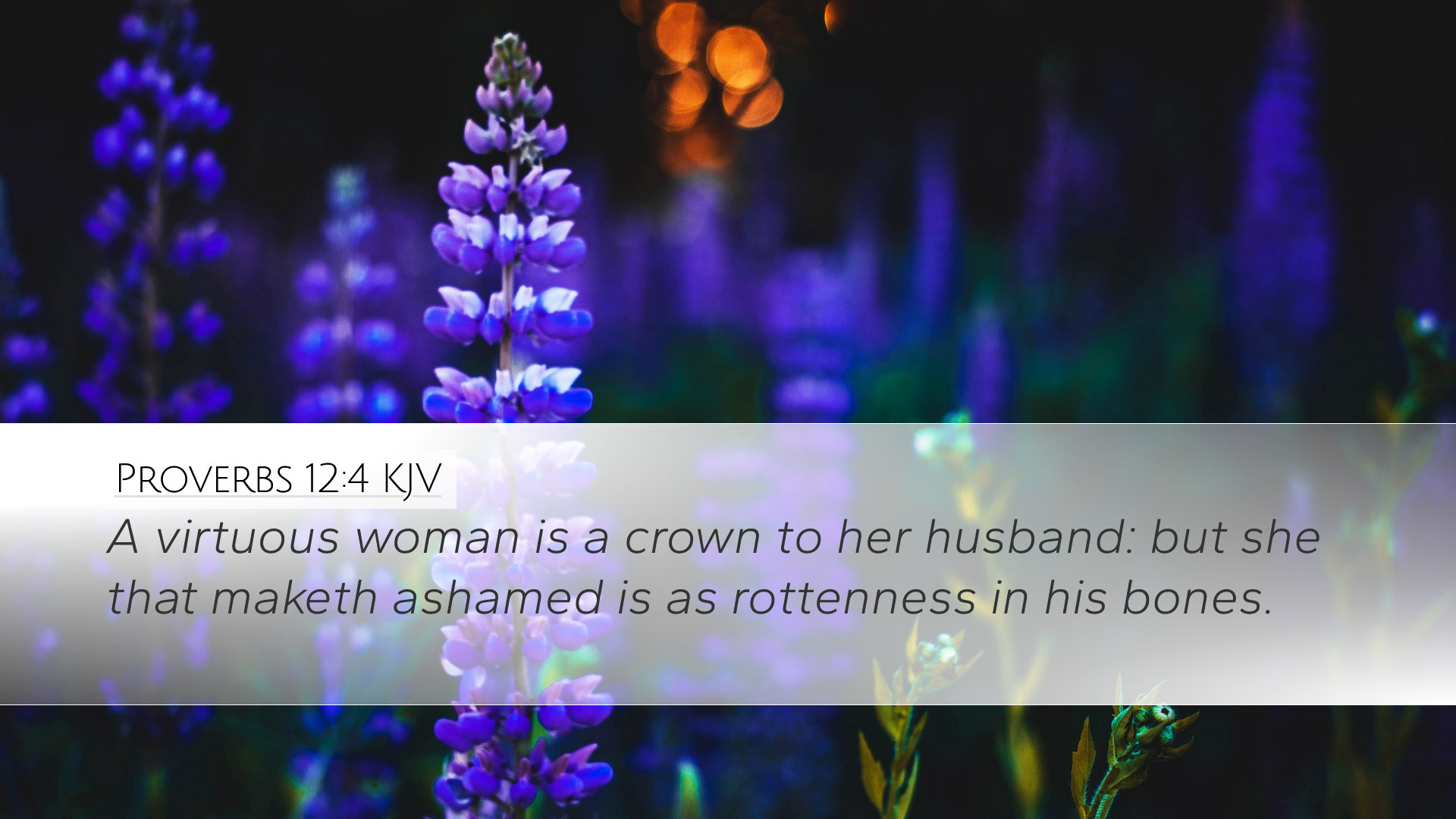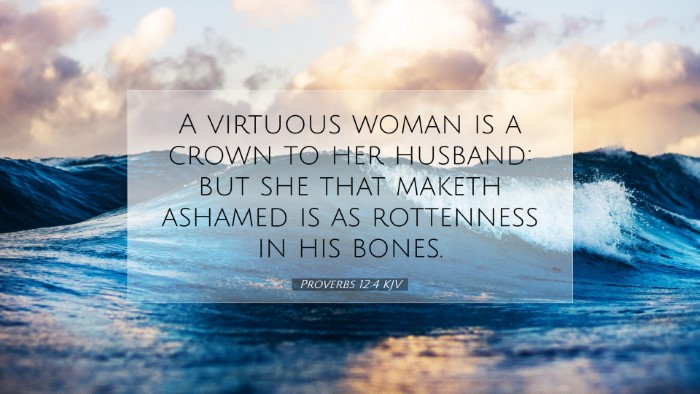Commentary on Proverbs 12:4
Proverbs 12:4 states: "A virtuous woman is a crown to her husband: but she that maketh ashamed is as rottenness in his bones." This verse speaks to the profound impact that a wife can have on her husband's life, character, and overall well-being. The juxtaposition of a "virtuous woman" and one who brings shame lays the groundwork for a deep understanding of marital dynamics, the value of character, and the spiritual implications of relationships.
Contextual Analysis
The Book of Proverbs, widely recognized as a collection of wisdom literature, presents teachings that reflect both moral and practical guidance. Here, the emphasis is placed on the characteristics of women, particularly within the context of marriage, which serves as a microcosm for the broader societal dynamics of virtue, honor, and shame.
Insights from Public Domain Commentaries
Matthew Henry's Commentary
Matthew Henry highlights the elevated status and significant blessings a virtuous wife brings into a household. He states that a virtuous woman not only complements her husband but also acts as a crown—symbolizing glory, honor, and worth. Such a woman enriches her husband's life, reinforcing his social standing and moral integrity. Henry notes that her virtue is a remarkable treasure, and it acts as an ornament to the husband’s character. In contrast, he asserts that a shameful or contentious woman diminishes her husband's strength and stature, making him feel degraded.
Albert Barnes' Notes on the Bible
Albert Barnes elaborates on the nature of a "virtuous woman." According to him, the Hebrew term for "virtuous" (חַיִל, chayil) encompasses not just moral uprightness but also strength and ability. Thus, a virtuous woman possesses both moral and practical qualities that positively influence her husband's life. Barnes also reflects on the metaphor of "rottenness in his bones," interpreting it as a representation of decay and internal strife that a man experiences when he is allied with a shameful partner. A failure in the marital relationship can deeply affect a man's emotional and spiritual well-being, leading to a disordered life.
Adam Clarke's Commentary
Adam Clarke comments on the social implications of the verse, pointing out that in biblical times, a woman’s character was closely linked with her husband's reputation. A virtuous woman, in Clarke's view, brings honor not only to herself but also to her husband and family. He contrasts this with the negative outcome of a woman who acts shamefully, as such behavior suggests a lack of wisdom and brings a disreputable life to both her and her husband. Clarke emphasizes that the shame brought into the household can be so severe that it affects the very core of a man's being, which he metaphorically describes as "rottenness in his bones."
Theological Implications
This verse introduces significant theological themes regarding the nature of relationships and the sanctity of marriage. By enlightening readers on the balance of virtue and shame, the scripture suggests that every individual can either uplift or degrade their partner. The choice of virtue leads to glorification and stability, while shame yields destruction and discord.
- Virtue as a Foundation: The text invites readers to consider the importance of building a marriage on the foundation of virtue. Both partners are called to nurture one another's strengths and uphold moral integrity.
- The Role of Women: This scripture highlights the influential role of women within the marital bond. Their character, attitudes, and actions have implications for the broader community.
- Consequences of Shame: The emotional and spiritual toll of a partner's shame suggests a holistic view of human relationships that applies to both genders.
Practical Applications
For pastors, students, and theologians, Proverbs 12:4 serves as a profound guide for counseling, teaching, and personal growth in the realm of marital relationships.
- Marital Counseling: This verse can be cited in counseling sessions to illustrate the importance of character in relationships. Counselors may use this behaviorally-charged metaphor to provoke deeper consideration of their choices within the marital union.
- Teaching on Virtue: Educators can frame discussions on the value of virtue in personal and communal life, depicting it as a source of strength and as crucial for positive relational dynamics.
- Community Reflection: Church leaders might encourage reflection on the roles both husbands and wives play in uplifting or diminishing one another’s dignity and respect within their congregations.
Conclusion
In conclusion, Proverbs 12:4 encapsulates essential wisdom regarding the impact of personal virtue and the role of women in their family structures. The teachings from Matthew Henry, Albert Barnes, and Adam Clarke together provide a comprehensive vision, inviting readers to consider the weight of their actions and choices in honoring their spouses. They emphasize that character transcends personal identity, influencing broader dynamics within families and communities. Through mutual respect and the pursuit of righteousness, marriages can flourish and reflect the glory intended in the divine design of companionship.


